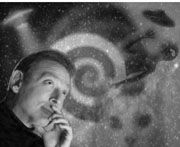A bright disk passed over Puget Sound flying north at approximately 5000-feet-per-second on April 28 at 7:07pm. The sighting was detailed to the National UFO Reporting Center based here in Seattle—including an account from a woman in Ballard and another from a man near Northgate. Although not mentioned on the 11 o’clock news, witnesses tried calling Coast to Coast AM, the late-night syndicated talk show about the paranormal. Art Bell, who started the program 16 years ago, creating a phenomenon with six million listeners, had retired the day before for personal reasons.
The successor to this peculiar and popular show was Seattle’s own veteran broadcaster, Mike Siegel. Gone were the deep mellifluous strains of Bell’s eccentric voice emanating from the timeless space of his home studio near Area 51 in Pahrump, Nevada. Instead listeners heard Siegel’s upbeat delivery and dogged interview style, carried over from his years as a political pundit on the radio—from Boston to Miami and then locally since 1988. Not exactly a ufologist, there’s lots of speculation on how he is flying on air.
Although Siegel was a personality on KING-AM and produced his own show statewide, he is possibly best known for a debacle on KVI-AM in 1996. The incident involved sustaining a wild rumor circulated by a disgruntled former city employee about then-Mayor Norm Rice allegedly having a homosexual affair. The on-air discussion got Siegel fired for jeopardizing the “integrity, credibility, and reputation” of parent company Fisher Broadcasting.
With Siegel now back on sister station KOMO-AM at the helm of Art Bell’s show, the issue of credibility takes on new meaning as he chats about aliens, crop circles, the Secret Government, and other inexplicables.
But this isn’t the first change of identities for Siegel. At one time he crusaded against Exxon, congressional pay raises, the S&L bailout, and even almost ran as a Democrat against Senator Slade Gorton. He switched chameleonlike when at KVI-AM, following Rush Limbaugh’s conservative hot talk format. Siegel’s effort to fill Bell’s iconoclastic shoes has raised plenty of eyebrows in the industry, as well as the hackles of die-hard Bell fans.
Supposedly Bell handpicked Siegel to assure that the traditional format would continue. Some wonder why Bell made such an odd choice. “Art feels a connection with Mike and believes he is the best person to carry on his legacy,” stated the press release from the program’s distributors, Premiere Radio Networks. Instead of an expert in the paranormal field, they selected a “seasoned broadcaster with a very developed curiosity.”
“Mike’s done an excellent job at maintaining 99 percent of the affiliate base. It’s still the most-listened-to overnight show,” comments Premiere spokesperson Amir Forester. She is clearly impressed by the new stats in light of Bell’s stranglehold on the time slot. The numbers may not hold up in Seattle, however, one of the show’s biggest markets. Fisher stations’ general manager, Rob Dunlop, admits the spring ratings suffered a sharp and significant drop of 37 percent, or roughly 25,000 listeners lost.
When Bell departed, KOMO immediately yanked off a Coast to Coast AM repeat in prime time (7 to 10pm). “It’s hard to keep the allure of Art’s unique personality,” says Dunlop.
Ironically, it was Dunlop who fired Siegel four years ago over the reporting of the rumor about Mayor Rice. Did residual acrimony hang on from the earlier incident? According to Dunlop, although there was considerable discussion about Siegel’s return to Fisher stations, company officials felt the subject matter was so different from Siegel’s former KVI show that it wasn’t fair to penalize him. One can also assume Fisher Broadcasting also had no desire to alienate Premiere Radio Networks, which distributes some of Seattle’s most popular shows: Rush Limbaugh on KVI-AM and Dr. Laura Schlessinger on KOMO-AM.
While most people agree Siegel is a solid talk show host, many question whether he is a true believer. Some members of the former Art Bell Chat Club say they don’t buy Siegel. He inherited the guest list and the devotees through no merit of his own, complains Charlette LeFevre of the Seattle chapter. She feels followers are resentful they weren’t consulted on the choice. Some loyalists are circulating a petition insisting Bell return.
Along the lines of the conspiracy theories regularly expounded on Coast to Coast AM, one listener speculates that Siegel is just a placeholder. Certainly any better fit might close the door on the possibility of the quirky Bell returning.
“Although there doesn’t appear to be any massive dumping of the show, it will take a couple more rating periods to evaluate,” says Al Peterson of Radio & Records, a trade journal. Although, as Peterson points out, there aren’t many other viable late-night options since it’s not a huge ratings or revenue source (the show airs live from 10pm to 2am and is repeated afterward until 6 am).
Unrivaled over the last 16 years, Bell was a trailblazer in the genre. A terrible crime and a bizarre rumor campaign helped drive him out of the spotlight. In 1997, a substitute high-school teacher was convicted of kidnapping and raping Bell’s teenage son. Subsequently, a retired FBI agent broadcast rumors on shortwave radio falsely accusing Bell of molestation. Bell is seeking redress in the courts and is coping with the psychological fallout, according to his farewell announcement.
Not denying the high learning curve, Siegel sounds genuinely enthused about the material, intrigued by the guests, and intensely respectful of the audience’s “pertinent and astute questions.” Relying on interrogation skills and a desire to hold government accountable, Siegel moderates the show with a mainstream aplomb. He notes the preparation is enormous. “It’s a constructive challenge that’s opening new vistas,” he says of the experience. “I’m enjoying it immensely.”
If he doesn’t have a natural affinity for topics ranging from pyramids to El Chupacabra, he’s a convert as well as a quick study. He takes issue with the description “wacky” for the show and retains objectivity, claiming: “Art never took a position and according to a Playboy interview claimed that 50 percent of the show was B.S.”
While Siegel probably feels more comfortable discussing politics, he seems equally fascinated with cat ghosts and ardent probes into hyperspace. He lends an air of credibility to the offbeat. When asked: What about parallel universes? He responds elusively, “Who knows?”







